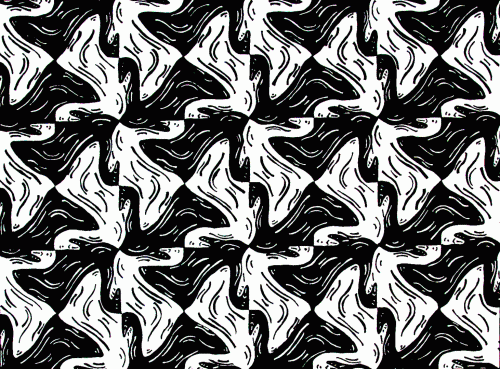Imitating Escher
This is an original work by my daughter, with a bit of help from me, with a bi-directional interlocking tile, ala Escher (in pen and ink, on poster board). This is actually surprisingly hard to pull off. Though Escher did birds, he did not do a swan in this style. As usual, click to enlarge:
The trick is to take a square piece of paper, and rotate whatever you cut from two sides to the other two adjacent sides. We destroyed a lot of post it notes until we got there. You can still see the ghost of the original square, with corners at the tip of the swan's head, the top of its wing, under its wing, and at the bottom of the neck.

Cool. I wonder if it would have been easier or harder to do with square pieces of 'digital' paper from the beginning?
Much easier to do it on digital paper: photoshop tutorials abound. Like http://www.photoshopforce.com/tutorials/seamless-repeating-tile-background/index.php
Still, kudos for doing it on paper. I wouldn't have thought it could be done, in a reasonable amount of time.
Exceptionally well done.
This reminds me of a good video lecture I watched a few days ago.
Craig Kaplan on "Mathematical Art and Artistic Mathematicians"
http://www.youtube.com/watch?v=EAPXYjEiOpI
Did she know she was doing math? :-) I also applaud your daughter's doing this by hand. These sorts of projects, especially the hand crafted ones, develop an intuitive understanding of math.
I have the coolest, most talented niece! Who knew such artistic talent could come from our gene pool?! Your niece continues to pursue her art also and I just scratch my head... Your girl is awesome! Love it.
This is excellent. I love it.
And I will not say a word, not one word, about obsessive/compulsive disorder. Not even the tiniest hint.
http://moby.to/gzb2r5
another challence?
lets give it a try http://moby.to/pvt7gk
Possibly neat and interesting: aperiodic tilings of the plane, in particular, Wang tiles.
Your tessellations are GREAT! What program did you use?
Cool!